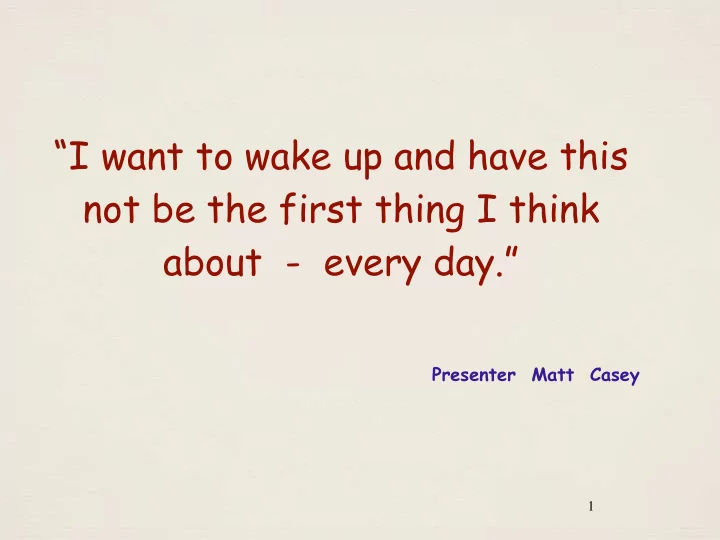

“I want to wake up and have this not be the first thing I think about - every day.” � � � Presenter Matt Casey 1
Sexual Abuse by Clergy • What makes dealing with clergy abuse, historical or otherwise, so difficult? – “Matt in the end it’s about the money” – “What if it’s not?” � • What are the conversations that go on around this? • What needs to change? 4
• What are current responses? � • Australian Catholic Church “Towards Healing” • What do you think that means � • I thought I would feel healed. • What does that mean. � � � � � 3
Sexual Abuse by Clergy • What do victims want? – I want to feel better – I want to feel innocent – I want to feel carefree – I was worried people might not think it was serious – I want to feel whole as a person • How much would that cost? • You could never pay me enough 4
� • Who needs to be involved? • How much attention is paid to relationships? • How important are relationships? – Relationships are fundamental to our human existence. As social beings we define ourselves by our relationships with others. Our most innate emotional and social needs in life, it seems, are met by those who are significant to us. The need to be loved and nurtured is probably the most important. The polar opposite of these good feelings is the shame family of emotions. Nathanson • What else is important? � 5
Victims of Abuse • How important are relationships? – Relationships are fundamental to our human existence. As social beings we define ourselves by our relationships with others. Our most innate emotional and social needs in life, it seems, are met by those who are significant to us. The need to be loved and nurtured is probably the most important. The polar opposite of these good feelings is the shame family of emotions. Nathanson • What else is important? • How do we change the current conversation? 2
• What did you think when this happened • What have you thought about since • How has this impacted on yourself and others? • What ’ s been the hardest thing for you? • What would you like to see happen now? 11
PRACTICE DOMAINS Where is our current WITH TO response? Pressure FIRM Limits Expectations FOR NOT FAIR Support - Encouragement - Nurturing
I know I will always be treated � “………………” � by those I respect. � � most people say “fairly” �
Fair Process • What is ‘Fair Process’? � • What is more important, process or outcomes? 5
Fair Process Engagement : Explanation Expectation Clarity Kim & Mauborgne, Harvard Business Review, July – August 1997
Shame “the central social regulator that governs our personal interactions with one another.” Nathanson 14
Theory of Affects POSITIVE AFFECTS NEUTRAL AFFECTS • Interest - Excitement • Surprise - Startle • Enjoyment - Joy NEGATIVE AFFECTS • Dissmell • Distress – Anguish • Disgust • Anger - Rage • Shame - Humiliation • Fear – Terror Tomkins in Nathanson
Shame Experiences • Someone’s Words •Why didn’t you think of buying milk on the way home you knew we used it all this morning? Adapted from Nathanson 18
Shame Experiences • A child doesn’t ask a question in class because she has felt stupid before when the question was viewed as too ignorant or inappropriate by fellow students or the teacher. Adapted from Nathanson 19
Nathanson’s Compass Of Shame ATTACK OTHERS WITHDRAWAL AVOIDANCE ATTACK SELF NATHANSON 1992 20 NATHANSON 1994
ATTACK OTHERS Blaming, physically or verbally lashing out at other people or things WITHDRAWAL AVOIDANCE Isolating oneself, Alcohol, drugs, Running and hiding, thrill seeking, sex, not speaking, driving workaholism Other away ATTACK SELF Self put down, doubt, loathing, blaming oneself. Behaving so as to fulfil others preconception. 21 NATHANSON 1992
� Mad Fight Be cross Hurt others Be cross with others Be mad at people (Attack Others) I Felt Like That I Felt Like That To The Shame Bear Run away and hide I felt like this too Go to your room Pretend it’s not happening Don’t want to play Don’t want to talk about it (Avoidance) (Withdrawal) The Crumpled One ( Shame) � Sad Feel sad Hurt yourself Say I’m Stupid Do naughty things to get into trouble Be Frightened (Attack Self)
� • The healthy management of shame involves owning it and taking responsibility for making things better • Acting on it instead of reacting to it • Revising and overcoming shame script is an individual task • but it is not accomplished in isolation. Don Catherall 19
� • Whether it be a professional therapist, a mens group or an AA sponsor, the individual who chooses to confront himself must do so before the eyes of another human being Don Catherall 20
• What happened? • What were you thinking at the time? • What have you thought about since? • Who has been affected by what you did? • In what way? • What do you think needs to happen to put things right? 10
Recommend
More recommend